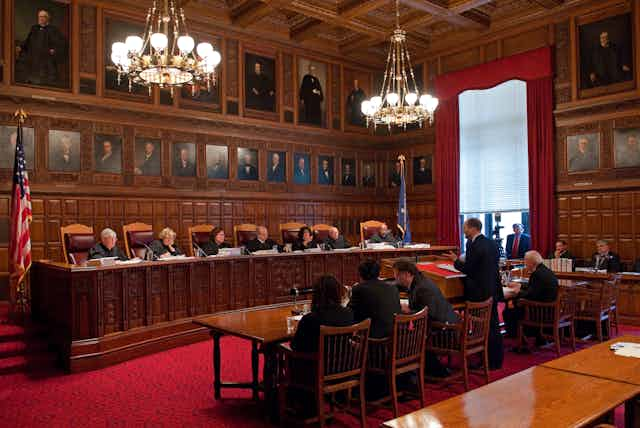People are often forgiven for actions that they would never get permission for in the first place – a phenomenon described as “Stuart’s Law of Retroaction”. Children who watch TV for longer than they are allowed to, teenagers who elope without telling their parents and adults who empty joint bank accounts without informing their spouse all seem to have an intuitive grasp of this.
But while it may sound like an innocent psychological quirk that we can’t do anything about, it is actually something that is having serious consequences in areas ranging from relationships to politics and the justice system. So what’s causing it and can we do anything about it? Let’s take a look at the science.
Time playing tricks
It may seem illogical, but research has confirmed that people have markedly different reactions to misdemeanours that have already happened to those that are going to happen in the future. We tend to judge future crimes to be more deliberate, less moral, and more deserving of punishment than equivalent transgressions in the past. Technically speaking, we exhibit “temporal asymmetries” in moral judgements.
This notion was recently tested in a series of studies by the psychologist Eugene Caruso. He gave adults stories describing two identical events – one that occurred at some point in the future and one that occurred an equal amount of time in the past. He then asked his participants to judge how unethical, deliberate, or deserving of praise or blame they thought these events were.

One of the hypothetical scenarios was that Coca-Cola was developing a new vending machine. The machine was designed to change the price of drinks depending on the temperature outside – on hotter days it would automatically spike the prices up. Half of the participants were told that the machine was tested last month, the other half that it is going to be tested in a month’s time. Caruso found that participants felt that the vending machine was considerably less fair if it was about to be tested in the future.
In another experiment, he showed that our bias toward future events is not limited to negative behaviours. When reading about a wealthy man who decided to make an anonymous charitable donation of US$5,000, participants saw his contribution as more generous when it was going to be performed in the future than when it had been performed in the past.
Overall, these studies showed that people judged transgressions more harshly and good deeds more positively if they believed that the events would take place in the future than if they had taken place already.

But an important question remains. Why do we do this? Research suggests that people rely on their emotions when making judgements of fairness and morality. When emotions run high, judgements are more extreme than when reactions are weak. One experiment in which people who imagined being jurors showed, for example, that the more outrage about a defendant’s actions, the more likely they were to propose tough sanctions. Conversely, someone with an impaired capacity to experience emotion, a psychopath for example, is less likely to recognise moral wrongdoings.
Caruso argues that his results can at least in part be explained by a difference in emotional responses to future and past events. People tend to report more intense reactions to the same event when they imagine experiencing it in the future than when they remember having experienced it in the past. This has been shown for considering a holiday, a menstrual cycle or being subjected to an unpleasant noise.
This may partly be because the future is generally more controllable than the past. From an evolutionary perspective, excitement may be beneficial as it can typically help us deal with an impending threat, such as escaping from a fire. The future is also generally more uncertain than the past – and uncertainty may intensify the unpleasantness of a negative event.
Dire consequences?
Whatever the reasons, studies suggest that there can be some pretty serious implications. In one of Caruso’s studies participants who imagined being jurors in a civil trial awarded more money to the victim of an accident who was about to suffer for six months than to one who had just suffered for six months. If past crimes are seen as less severe than future crimes, then past injustices will be met with less severe punishment than equivalent future ones.
Those seeking to minimise the repercussions of their actions may take advantage of this. For example, a government looking to implement an ethically questionable surveillance technique may choose to simply go ahead with it without a public consultation and deal with the consequences later.
But it’s not all bad news. Being aware of this fundamental difference between judgements of past and future events can help us become more consistent judges of moral behaviour. One thing we do know is that this bias may not be present in young children, who are more short-sighted in their decision-making than adults. Does our bias toward the future emerge as we get older? Can it be taught? Maybe, if we can figure out the answer to that question, we’ll be able to build a world where crimes are judged irrespective of their locations in time.

